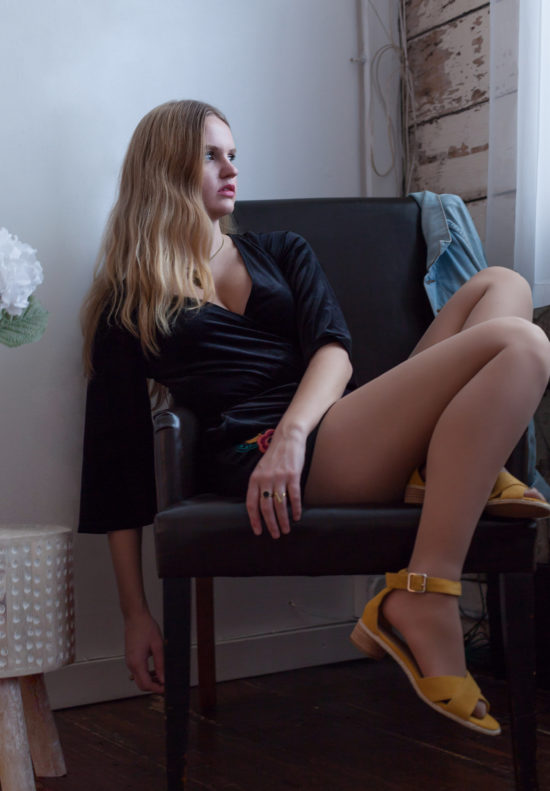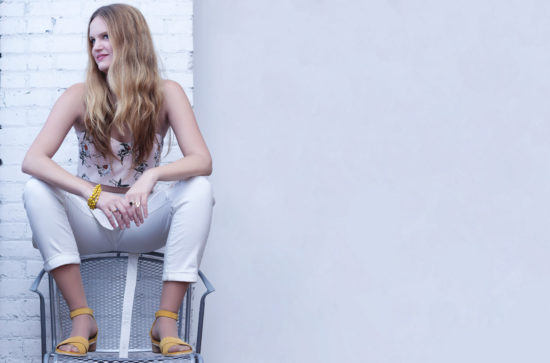Megan Kitt, founder of Tuli Jewelry explains her journey about how she created the brand and why she got inspired to raise awareness and fight poverty in East Africa.
“Kampala is crimson: the deep rust of the dirt roads, the bold scarlet prints lining market stalls, the blood-red sun sinking below its many hills. It’s an eclectic city of countless intrigue, and as I walked its streets for the first time, its frenzy of activity reminded me of something worlds away: backstage at a fashion show, a frenetic realm in which stylists and photographers dart between people just as Ugandan motorbikes dodge humans and animals alike.
This meeting of the worlds was a long time coming: For years, I worked as a fashion model in cities across the U.S. and the world, where I fell in love with the creativity of the industry. As a model, I bore witness to elite artistic minds as they styled and produced shoots, and I knew that was only a taste of the process. From conception to production, styling to editing, the possibilities were endless.
Eventually, I left the industry to work as a journalist, and that’s how, years later, I found myself in a Kampala marketplace watching women lay out their bold beads in hues of blues, purples, and, of course, reds.
Uganda’s unemployment rate is staggering, and these women – and thousands more – were so desperate for work that they salvaged paper to roll tightly into beads, paint by hand, and string into jewelry. Every day, they’d take their jewelry to market, though sales were scarce.
I thought back to my days in fashion, the elaborate photo shoots that yielded ads for pieces that often were made under questionable labor practices. As much as I loved fashion, I often worried what sort of impact my industry was having on the world. I wondered: If I could create similar imagery, could I create a market for these women? Could I take what I loved about the fashion industry and improve what I didn’t?
Together with a group of three women, I worked to adapt their paper beads for an international market. We boosted the quality of our materials, created standards for uniformity, and designed pieces that would fit in among the glossy pages of magazines. I returned home with a suitcase full of jewelry.
I credit my time modeling for what happened next: I used the connections I forged over the years to produce a modest shoot, which we used to sell our first products. All the years I’d spent on set chatting with people about their jobs and their early successes paid off, and I knew the vernacular of the industry in a way that made me look like I had a clue, not like I was a 24-year-old kid who had a scheme and a suitcase of jewelry.
That was five years ago. Today, Tuli works with two dozen people in both Uganda and Kenya, selling jewelry made of recycled paper and brass. While we’re still relatively small, we’re growing fast. We send 70% of our revenue directly back to East Africa, and I’ve watched firsthand as our artisans’ lives have been transformed. Their families are fed, their children attend school through university, and they rise out of poverty. It’s truly a testament to how the large, booming fashion industry can do good in the world while creating products with elevated design and quality.
Although I started Tuli to scratch a creative itch and to provide opportunity where little exists, I’ve also begun trying to change the fashion industry. I’d like to keep the creativity and lose the harm, by encouraging fair labor practices and the use of recycled materials.
Similarly, I’d like to keep the empowerment I felt as a model, the confidence in my lanky body that I developed, while leaving the negative, constant sc rutiny of models’ faces and bodies and the one-size-fits-all beauty standards of the industry. Tuli’s models area mixture of professional models and ordinary women, and our shoots are grounded in encouragement. As much as I loved modeling, there were plenty of jobs that left me hating every aspect of my appearance, so instead, we seek to build confidence in all types of beauty.
rutiny of models’ faces and bodies and the one-size-fits-all beauty standards of the industry. Tuli’s models area mixture of professional models and ordinary women, and our shoots are grounded in encouragement. As much as I loved modeling, there were plenty of jobs that left me hating every aspect of my appearance, so instead, we seek to build confidence in all types of beauty.
Our mission as a company is to empower and uplift people, both in East Africa and here in the United States. Fashion, an industry that’s grounded in self-expression, is the perfect setting to do just that.”

